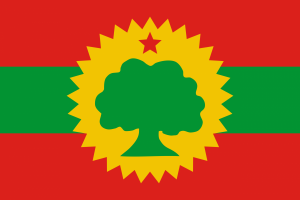Language/Borana-arsi-guji-oromo/Vocabulary/Common-Greetings
| ◀️ Basic Sentence Structure — Previous Lesson | Next Lesson — Self-Introduction ▶️ |
Introduction[edit | edit source]
Welcome to the lesson on common greetings in Borana-Arsi-Guji Oromo! In this lesson, we will focus on learning how to greet people and respond to greetings in both formal and informal settings. Greetings are an essential part of any language and culture, as they help establish connections and show respect to others. By mastering the common greetings in Borana-Arsi-Guji Oromo, you will be able to confidently engage in conversations and make a positive impression on native speakers. So, let's dive in and explore the fascinating world of Borana-Arsi-Guji Oromo greetings!
Cultural Insights[edit | edit source]
Before we delve into the specific greetings, let's take a moment to appreciate the cultural significance of greetings in Borana-Arsi-Guji Oromo society. Greetings play a vital role in Oromo culture, as they reflect the values of respect, hospitality, and community. When meeting someone, it is customary to greet them warmly and inquire about their well-being, family, and other personal matters. This demonstrates care and genuine interest in the other person's life, fostering a sense of belonging and connection. Moreover, greetings are often accompanied by handshakes, hugs, or other physical gestures, emphasizing the importance of physical proximity and human touch in Oromo culture. By understanding the cultural context of greetings, you will be able to engage in conversations with a deeper appreciation for the rich Oromo heritage.
Common Greetings[edit | edit source]
Now, let's start learning some of the most common greetings in Borana-Arsi-Guji Oromo. In this section, we will cover both formal and informal greetings, as it is essential to adapt your language based on the situation and the level of familiarity with the person you are greeting. Pay close attention to the pronunciation and practice speaking aloud to improve your fluency. Remember, practice makes perfect!
Formal Greetings[edit | edit source]
Formal greetings are used when addressing elders, respected individuals, or in more formal settings such as workplaces or official events. These greetings show respect and convey a sense of politeness. Here are some formal greetings in Borana-Arsi-Guji Oromo:
| Borana-Arsi-Guji Oromo | Pronunciation | English Translation |
|---|---|---|
| "Akka ta'ee?" | /ak.kɑ tɑːʔeː/ | "How are you?" |
| "Akka ta'ee, wayyaa?" | /ak.kɑ tɑːʔeː, wɑj.jɑː/ | "How are you, sir/madam?" |
| "Nagaan dhufeen?" | /nɑ.gɑːn dʰu.feːn/ | "How is your day?" |
| "Nagaan dhufeen, akkan dubbataa?" | /nɑ.gɑːn dʰu.feːn, ak.kɑn dʊb.bɑ.tɑː/ | "How is your day, may I ask?" |
| "Galatoomi" | /gɑ.lɑ.toː.mi/ | "Thank you" |
| "Galatoomi, akka nama hin dhufne?" | /gɑ.lɑ.toː.mi, ak.kɑ nɑ.mɑ hin dʰu.fneː/ | "Thank you, how is your health?" |
Informal Greetings[edit | edit source]
Informal greetings are used among friends, peers, and younger individuals. They are more casual and reflect a sense of familiarity and closeness. Here are some informal greetings in Borana-Arsi-Guji Oromo:
| Borana-Arsi-Guji Oromo | Pronunciation | English Translation |
|---|---|---|
| "Kormee?" | /kor.meː/ | "What's up?" |
| "Kormee, wayyaa?" | /kor.meː, wɑj.jɑː/ | "What's up, dude?" |
| "Nagaa dhufte?" | /nɑ.gɑː dʰuf.teː/ | "How's it going?" |
| "Nagaa dhufte, akka nama hin jirre?" | /nɑ.gɑː dʰuf.teː, ak.kɑ nɑ.mɑ hin dʒir.reː/ | "How's it going, where have you been?" |
| "Galatooma" | /gɑ.lɑ.toː.mɑ/ | "Thank you" |
| "Galatooma, akka nama hin dhufne?" | /gɑ.lɑ.toː.mɑ, ak.kɑ nɑ.mɑ hin dʰu.fneː/ | "Thank you, how is your health?" |
As you can see, the formal greetings are more elaborate and include inquiries about the other person's well-being or day. On the other hand, informal greetings are shorter and often involve casual inquiries about the person's current state. It is essential to choose the appropriate greeting based on the context and the level of familiarity with the person you are addressing.
Practice Exercises[edit | edit source]
Now that you have learned the common greetings in Borana-Arsi-Guji Oromo, it's time to put your knowledge into practice! Here are some practice exercises for you to test your understanding and improve your fluency:
Exercise 1: Match the Borana-Arsi-Guji Oromo greeting with its English translation.
1. Akka ta'ee? 2. Nagaan dhufeen? 3. Galatoomi 4. Kormee? 5. Nagaa dhufte?
a. How are you? b. How's it going? c. Thank you d. What's up? e. How is your day?
Solution: 1 - a 2 - e 3 - c 4 - d 5 - b
Exercise 2: Formulate a formal greeting and an informal greeting for the following situations: meeting your teacher for the first time and meeting your best friend after a long time.
Solution: Formal greeting for meeting your teacher: "Akka ta'ee, wayyaa?" Informal greeting for meeting your best friend: "Kormee?"
Take your time to complete these exercises and compare your answers to the solutions provided. Practice speaking aloud to improve your pronunciation and fluency.
Conclusion[edit | edit source]
Congratulations! You have successfully learned the common greetings in Borana-Arsi-Guji Oromo. By understanding and practicing these greetings, you will be able to confidently greet people in both formal and informal settings. Remember to adapt your language based on the context and the level of familiarity with the person you are addressing. Greetings are a crucial aspect of the Oromo culture, reflecting values of respect, hospitality, and community. Keep practicing and exploring the fascinating world of Borana-Arsi-Guji Oromo language and culture. Galatoomi!
Sources[edit | edit source]
Other Lessons[edit | edit source]
- Numbers 1 20
- Family Members
- Time Yeroo
- Feelings and Emotions
- Drinks
- Clothes
- Express Surprise
- Colors
- Telling Time
- How to say Good Bye?
Template:Borana-arsi-guji-oromo-Page-Bottom
| ◀️ Basic Sentence Structure — Previous Lesson | Next Lesson — Self-Introduction ▶️ |

